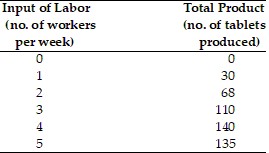If the law of diminishing marginal product holds true and workers emigrate from Haiti, the wage rate of workers who remain in Haiti would be expected to:
A. fall because fewer workers are working with the same amount of capital.
B. rise because fewer workers are working with the same amount of capital.
C. rise because more workers are working with the same amount of capital.
D. fall because more workers are working with the same amount of capital.
Answer: B
You might also like to view...
Pumpkins are grown in New Mexico with the aid of fertilizer. Hence, fertilizer is a partial answer to which of the three economic questions?
What will be an ideal response?
Economic policy
a. always follows economic theory. b. develops rules and principles of economics. c. is often modified by political and social considerations. d. All of these.
"Most textiles worn by American consumers are produced in Asian and South American countries where the opportunity costs of production are lower." This observation refers to the:
a. law of supply. b. income elasticity of demand. c. principle of beneficial tariffs. d. principle of comparative advantage. e. law of decreasing returns to scale.
 In the above table, marginal product becomes negative when employing the
In the above table, marginal product becomes negative when employing the
A. fourth worker. B. second worker. C. third worker. D. fifth worker.